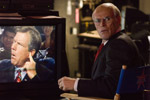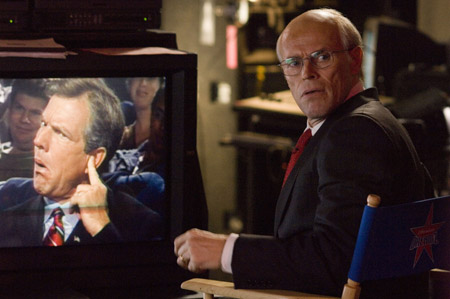American Dreamz
 “You make me feel like a better person, and I’m… not a better person,” says Martin Tweed (Hugh Grant) to his girlfriend as she announces she’s leaving him. Indifference is a word that requires more effort to type than the emotion that typifies Tweed’s attitude toward her. He’s of course a caricature of Simon Cowell, the garrulous talent judge of the ubiquitous…
“You make me feel like a better person, and I’m… not a better person,” says Martin Tweed (Hugh Grant) to his girlfriend as she announces she’s leaving him. Indifference is a word that requires more effort to type than the emotion that typifies Tweed’s attitude toward her. He’s of course a caricature of Simon Cowell, the garrulous talent judge of the ubiquitous…

in Universal Pictures’ “American Dreamz.” Photo Credit: Glen Wilson
“You make me feel like a better person, and I’m… not a better person,” says Martin Tweed (Hugh Grant) to his girlfriend as she announces she’s leaving him. Indifference is a word that requires more effort to type than the emotion that typifies Tweed’s attitude toward her. He’s of course a caricature of Simon Cowell, the garrulous talent judge of the ubiquitous “American Idol” television show. Cowell is himself cartoonish enough that any parody begs the obvious question of utility.
Inside of “American Dreamz” is a meaningful hypothesis wanting to come out: How dangerous would a President like George Bush be if he actually took the time to scrutinize, question and learn? “I’m gonna read the newspaper,” declares President Staton (Dennis Quaid) one day when it suddenly occurs to him he might actually acquire knowledge he hadn’t before possessed. Unfortunately, this isn’t a documentary and it’s not a clinical experiment, it’s an attempt at a satire. As with “Scary Movie 4” and many other lampoons of late, I find myself growing more and more impatient with their dutiful barrage of limp jokes that have either been done better (Will Ferrell’s George W. Bush comes to mind) or have simply been done at all (e.g. Cheney as puppetmaster).
The president is portrayed as someone’s idea of a caricature of George W. Bush—not the brightest bulb on the tree, and quite the patsy. As he begins to take interest in world affairs in a genuine manner, he becomes a threat to the status quo in the eyes of Sutter (Willem Dafoe), his Chief of Staff.
Before you decide to throw this review out the window, I’m not interested in getting political. Sure, I’m not a big fan of the current administration, but that doesn’t magically transform this otherwise pallid collection of frames into what one might call an entertaining movie, much less a biting satire of politics and television. But back to the film…
Sutter, as the Cheney parallel, is of course played as the brains of the operation. Therefore, any risks Staton takes are potentially crippling to Sutter’s political influence. Deep down, Staton’s a good guy—just underinformed, considerably so. An opportunity arises amidst Sutter’s PR nightmare to secure public confidence by, of all things, having Staton guest-judge on the insanely-popular American Dreamz TV show.
Elsewhere in the world, Islamic radicals prepare for Jihad against the U.S. Making a video to show the world their terrorist training camps, the director repeatedly yells, “Cut,” because the trainees keep falling off the obstacle course. The terrorist leader dispatches his sister’s uncoordinated cousin, Omer, to Orange County to await instructions from a sleeper cell. Omer has other aspirations, however. Let’s just say he’s a huge fan of Hamlisch and Kleban.
Already you can see the plot unfolding around Omer, who receives coaching from his ostentatious queen of a cousin, Iqbal (Tony Yalda). You see it all coalescing right when you hear Tweed tell his staff that he’s bored with the usual contestants, demanding, “Bring me some freaks.” The freaks include a Jewish candidate for a Maurice Starr- or Ron Perlman-moneymaking machine, a Clay Aiken clone (why nobody in the audience got this joke is beyond me), and Mandy Moore playing Sally Kendoo as such an overt parody of a certain Mrs. Federline you wonder why they simply didn’t cast Britney to play herself. Though, unlike Mrs. Federline, Mandy Moore can act—evident from her role as the sanctimonious Hillary Faye in “Saved!”
There is another aspect to this movie that says more about Hollywood than it says about politicians and/or singers. At one point, Sally observes in her fervor to achieve more than merely fame, “Any idiot can be on TV.” It’s well known that television is considered, and probably for good reason, inferior to film. What is less perceived, or less accepted, is the fact that cinema is just as rife with trash. It figures, then, that Universal Pictures would see fit to inject multiple jabs at the world of television while unable to re-examine its own hubris. A key example would be the fact that, despite the film’s desire to be something of a “Spinal Tap,” the movie dare not venture too far into the territory of deconstructing the vacuity of the entertainment industry. When it’s time for Mandy Moore to do her musical numbers, the camera angles shift into “stage show” mode, sweeping to cheaply force the audience’s perspective, doting on Moore. The satire comes to a screeching halt every time a song recorded for the film must be wheeled out for self-promotion. Nowhere in these moments are the big names, the film makers or the writers willing to take jabs at the recording or motion picture industries who produce movie vehicles for recording artists with a degree of consistency that seems to tire even the casual moviegoer.
It was quite evident from the mixed reactions to Jon Stewart’s monologues at the Academy Awards that Hollywood loves it when everyone else but themselves is the butt of the joke. They have no sense of humor, and produce film after film that proves it. This is no particular exception. Seeing President Staton reading “Jihad vs. McWorld,” for example. It would have been far more insidiously funny, and dangerous to the establishment, to see him poring over items in the President’s Daily Brief.
The Jewish contestant is a throwaway character who isn’t fleshed out at all. All the more damning, then, is the parallel between Tweed’s affair with Kendoo, his loathesomely selfish equal, and the film’s necessity of shoving her character in the spotlight ahead of the Jewish kid. It’s as if to say that the film exists not as a story for our entertainment and enlightenment, but as a forcible promotional vehicle for Mandy Moore to which a story has been tacked on for the appearance of a movie when in fact it’s just an uncleverly disguised commercial.
Iqbal playing the hysterical queen elicits laughter as though the entire audience has not watched a single, mechanistically-scripted and manipulated episode of MTV’s “The Real World” or “Queer Eye for the Straight Guy”, both in which gay stereotypes are constantly amplified and paraded out for sensationalistic value.
The sleeper cell, when it does track down Omer, can’t resist his aunt’s (Shohreh Aghdashloo) grapefruit sorbet while laying out their devastating plans for the assassination. Omer, however, begins to have doubts as his appreciation for Americans grows.
There’s hardly any serious side to the terrorists, so preposterously caricaturized and kept in a state of constant comic relief that any of the jokes (e.g. catching up with the latest episode of “American Dreamz” on TiVO) simply flounder along with the arrhythmia and spastic meter of Bob Hope reading off cue cards. Sure, Marilyn Monroe was so horrible at remembering her lines that it’s well-known Billy Wilder frequently used cue cards during the filming of “Some Like It Hot” and “The Seven Year Itch.” The difference is that Monroe could deliver and elocute from those cards with enough timing and dynamics to land the punchlines on cue in films that were meant to be silly from start to finish.
There are several possibilities that were never explored with this film, including a closer examination of the Riza family with whom cousin Omer stays. Had the siblings, Iqbal and his sister Shazzy, been fleshed out more thoroughly, a story centering on this family alone would have been many times funnier than the film that exists. Also, Dennis Quaid becomes oddly more likeable as the film progresses, but his character is stuck in one of many subplots, the sum total of which never gel together in a coherent and consistently entertaining whole. Still, the politics of puppetry (or the puppetry of politics) has been exposed far better in films like “Bob Roberts” and “Wag the Dog,” which isn’t to say they were spectacular movies… just better than this one.
 American Dreamz • Dolby® Digital surround sound in select theatres • Running Time: 107 minutes • MPAA Rating: PG-13 for brief strong language and some sexual references. • Distributed by Universal Pictures
American Dreamz • Dolby® Digital surround sound in select theatres • Running Time: 107 minutes • MPAA Rating: PG-13 for brief strong language and some sexual references. • Distributed by Universal Pictures